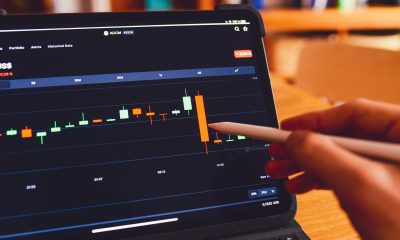Africa
Rising Core Inflation and Household Pessimism in Morocco Highlight Economic Challenges for 2025
Despite a moderate 0.9% CPI rise in 2024, core inflation at 2.4% reflects persistent pressures on essentials like food, fuel, and services, straining household budgets. Nearly all households report rising food costs, fueling pessimism. Key inflation drivers include housing and tourism, with regional disparities. Addressing dependence on imports and structural reforms are crucial for 2025.

At a time when the average annual CPI has increased by 0.9% in 2024, and the annual core inflation indicator is recording an increase of 2.4%, the gulf is widening in terms of household perception. This is one of the major lessons of the permanent economic survey, the results of which have just been revealed by the HCP.
Between measured inflation and inflation perceived or experienced by consumers, households’ feelings remain negative about the evolution of the standard of living. While the average annual consumer price index (CPI) increased by 0.9% in 2024 and the annual core inflation indicator increased by 2.4%, according to the latest HCP note, households’ perception and experience lean, almost unanimously, towards an increase in food prices.
Ali Rhanbouri, president of the Centre for Economic and Social Prospecting, sees this as a sign of “greater inflationary pressure on products for regular consumption.”
For the expert, “this means that, despite apparent price stability, households are feeling the increases more in essential categories such as food, fuel and services” (see interview opposite).
Food products: most households report that prices have increased
This observed increase is the consequence, according to the HCP, of the increase in the food products index of 0.8% and that of non-food products of 1.2%. The variations recorded for non-food products range from a decrease of 1.3% for “Health” to an increase of 3.4% for “Restaurants and hotels”.
Alongside these figures, almost all households (97.5%), in the fourth quarter of 2024, report that food prices have increased over the past 12 months. A balance of opinion identical to that of the previous third quarter, compared to -97.4 points year-on-year.
As for the outlook for their evolution over the next 12 months, food prices should continue to increase according to 83.3% of households, compared to only 1.5% who expect them to fall. The balance of opinion thus remained negative, standing at -81.8 points, instead of -83.5 points recorded a quarter earlier and -77.6 points a year earlier.
Annual CPI: the most significant increases recorded in the South
In detail, the CPI, which covers a fixed basket containing 546 items and 1,391 varieties, shows an increase of 3.4% in the “Restaurants and hotels” section, which partly explains the effect of inflation on the tourism sector and its related activities. The second most significant increase concerns the “Housing, water, electricity and other fuels” section (+2.6%).
“Alcoholic beverages and tobacco” completes the podium (+2.3%). By city, the most significant increases in the annual CPI were recorded in Laayoune (+3%), Guelmim (+2.2%), Dakhla and Safi (+1.7%).
Furthermore, there was a +1.6% in Agadir, +1.5% in Fez, Rabat and Tetouan, +1.3% for Marrakech, +1.1% for Errachidia, +0.8% for Casablanca and Al-Hoceima, +0.7% for Kenitra, and +0.6% in Tangier and Settat.
How do you read the annual evolution of the CPI in 2024 in relation to the issue of inflation?
The evolution of the consumer price index in 2024 reflects moderate inflation with an average annual increase of 0.9%. However, core inflation, which excludes products with volatile prices and public tariffs, stands at 2.4%. This reflects greater inflationary pressure on products for regular consumption. Above all, this means that despite apparent price stability, households are feeling the increases more in essential categories such as food, fuel and services.
This difference between moderate headline inflation and higher core inflation highlights an economic reality where the prices of essential goods and services continue to weigh on purchasing power.
For example, although the prices of vegetables and fruits fell by 3.9% and 2.3% respectively in December, basic products such as meat (+1%) and oils (+0.8%) saw their prices increase, increasing the cost of living for households.
Moroccan households remain pessimistic about the evolution of the economic situation
Household pessimism, as observed in the HCP’s permanent economic survey, is a clear indicator of persistent economic difficulties. Despite the overall decline in the CPI, households perceive few concrete improvements in their daily lives. This feeling is fueled by several factors: persistent underlying inflation, an increase in the prices of essential services such as housing and fuel (+2.6%), which directly affects their budget.
The feeling of economic stagnation among households can also be explained by the perception that price adjustments in certain key sectors such as transport do not reflect changes in international costs fairly or quickly.
In other words, although international fuel prices have seen a notable decline, this decrease has only translated into a marginal reduction in costs in the transport sector in Morocco (-0.2% between November and December 2024).
For households, this situation is perceived as a lack of concrete benefit from global economic dynamics, which increases their frustration, because they see international prices falling, but do not feel the positive impact on their daily lives, particularly in essential services such as transport. This gap between global economic realities and their local repercussions therefore fuels a feeling of stagnation or even economic injustice.
How will inflation develope this year?
The outlook for 2025 depends on several domestic and international economic factors. First, the development of international commodity prices will play a crucial role. If energy prices remain stable or decline, this could ease inflationary pressure, but geopolitical tensions or supply chain disruptions could reverse this trend. Second, domestic economic and monetary policy will be decisive.
Indeed, if measures are taken to strengthen household purchasing power and control trade margins in certain sectors, inflation could be brought under control. However, if dependence on imports persists, particularly for food products, fluctuations in international markets will continue to have repercussions on domestic prices.
Finally, the core inflation indicator, which stood at 2.4% in 2024, could remain high if no structural reforms are implemented. Price increases in sectors such as housing or services could persist, contributing to maintaining a high level of inflation felt by households.
In conclusion, 2025 is shaping up to be a pivotal year. If efforts are made to stabilise prices, notably by reducing dependence on imports and promoting competition, this could improve the situation. However, in the absence of such measures, inflation could continue to weigh on households, reinforcing their pessimism about economic developments.
__
(Featured image by Sergey Pesterev via Unsplash)
DISCLAIMER: This article was written by a third party contributor and does not reflect the opinion of Born2Invest, its management, staff or its associates. Please review our disclaimer for more information.
This article may include forward-looking statements. These forward-looking statements generally are identified by the words “believe,” “project,” “estimate,” “become,” “plan,” “will,” and similar expressions. These forward-looking statements involve known and unknown risks as well as uncertainties, including those discussed in the following cautionary statements and elsewhere in this article and on this site. Although the Company may believe that its expectations are based on reasonable assumptions, the actual results that the Company may achieve may differ materially from any forward-looking statements, which reflect the opinions of the management of the Company only as of the date hereof. Additionally, please make sure to read these important disclosures.
First published in LES ECO.ma. A third-party contributor translated and adapted the article from the original. In case of discrepancy, the original will prevail.
Although we made reasonable efforts to provide accurate translations, some parts may be incorrect. Born2Invest assumes no responsibility for errors, omissions or ambiguities in the translations provided on this website. Any person or entity relying on translated content does so at their own risk. Born2Invest is not responsible for losses caused by such reliance on the accuracy or reliability of translated information. If you wish to report an error or inaccuracy in the translation, we encourage you to contact us

-

 Africa1 week ago
Africa1 week agoCameroon’s Government Payment Delays Exceed 200 Days, Straining Businesses and Public Finances
-

 Crowdfunding2 weeks ago
Crowdfunding2 weeks agoThe Youth Program at Enzian Shooting Club Is Expanding Thanks to Crowdfunding
-

 Africa2 days ago
Africa2 days agoMorocco’s Industrial Activity Stalls in January 2026
-

 Crypto1 week ago
Crypto1 week agoTariff Turmoil Sends Bitcoin and Ethereum Lower as Crypto Markets Face Mounting Pressure

























